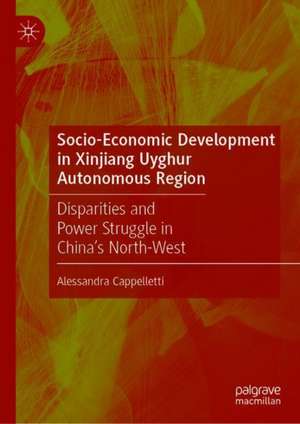Socio-Economic Development in Xinjiang Uyghur Autonomous Region: Disparities and Power Struggle in China’s North-West
Autor Alessandra Cappellettien Limba Engleză Hardback – 2 ian 2020
| Toate formatele și edițiile | Preț | Express |
|---|---|---|
| Paperback (1) | 585.08 lei 43-57 zile | |
| Springer Nature Singapore – 2 ian 2021 | 585.08 lei 43-57 zile | |
| Hardback (1) | 511.31 lei 38-44 zile | |
| Springer Nature Singapore – 2 ian 2020 | 511.31 lei 38-44 zile |
Preț: 511.31 lei
Preț vechi: 555.77 lei
-8% Nou
Puncte Express: 767
Preț estimativ în valută:
97.85€ • 101.58$ • 81.59£
97.85€ • 101.58$ • 81.59£
Carte tipărită la comandă
Livrare economică 19-25 martie
Preluare comenzi: 021 569.72.76
Specificații
ISBN-13: 9789811515354
ISBN-10: 9811515352
Pagini: 317
Ilustrații: XXIII, 317 p. 43 illus., 39 illus. in color.
Dimensiuni: 148 x 210 mm
Greutate: 0.56 kg
Ediția:1st ed. 2020
Editura: Springer Nature Singapore
Colecția Palgrave Macmillan
Locul publicării:Singapore, Singapore
ISBN-10: 9811515352
Pagini: 317
Ilustrații: XXIII, 317 p. 43 illus., 39 illus. in color.
Dimensiuni: 148 x 210 mm
Greutate: 0.56 kg
Ediția:1st ed. 2020
Editura: Springer Nature Singapore
Colecția Palgrave Macmillan
Locul publicării:Singapore, Singapore
Cuprins
Introduction.- Previous scholarship, methodology and the concept of development.- Xinjiang Economic Development.- Social development in Xinjiang Uyghur Autonomous Region.- Walking in Two Worlds: Kashgar and Shihezi.- Land use and acquisition dynamics in Kashgar: power struggles and social change in a contemporary oasis.- Uyghurs vs Uyghurs. Fragmented identities in contemporary Xinjiang.- Conclusions – The CCP and a “bridge society” in XUAR: ethnicity as a tool for social engineering and stratification.
Recenzii
“Cappelletti provides a highly nuanced and illuminating account of ethnic relations in the region and what it means to be a Uyghur. It is a valuable contribution to the scholarly literature on Xinjiang. … This is a detailed book that will be of interest to scholars researching Xinjiang, the situation of the Uyghurs, as well as research of internal colonies more generally.” (Anna Hayes, China Information, Vol. 35 (1), 2021)
Notă biografică
Alessandra Cappelletti is Associate Professor at the Department of International Relations at Xi’an Jiaotong Liverpool University, China. She has a PhD at the Oriental University of Naples and was Joint Postdoctoral Fellow at the Institute of East Asian Studies (IN-EAST) and at the Käte Hamburger Kolleg/Research Center for Global Cooperation of the University of Duisburg-Essen in Germany.
Textul de pe ultima copertă
In an unprecedented exploration of space and power in rural Xinjiang, a Chinese region home to the Muslim population of the Uyghurs, this book adopts a grounded theory approach and a trans-ethnic perspective into the complex and sensitive topic of land issues and agricultural land evictions in Xinjiang Uyghur Autonomous Region. By exposing the dynamics of land acquisition and power building in the politically contested space of the region, the author shows how state owned land in a key commercial and cultural hub on the new Silk Road became a commodity, in a context of violent human interactions driven by power. Relying on previously undisclosed material and on a unique field research among farmers and local authorities, the author retraces the steps of Uyghur peasant workers, entangled in a suspended situation between abandoned rural villages, migration and urban alienation, in a book which explores agency in violent processes of social change, and adds concepts and insights to the current knowledge of how we become modern citizens. The microcosm of Kashgar, an oasis-city in Xinjiang, acts as a mirror reflecting socio political dynamics framing people’s identity. Shedding light on one of the most inaccessible region in China, this book is a key read for academics and a broader public willing to get a clearer view of one of the sourest power struggle in the most contested region within the next superpower.
Caracteristici
Examines socio-economic development and identity building in Xinjiang Uyghur Autonomous Region (XUAR) Highlights challenges faced by the region in terms of cultural diversity, richness in resources, geo-strategic location and environment Focuses on the dynamics underpinning social change and disparities in Xinjiang
